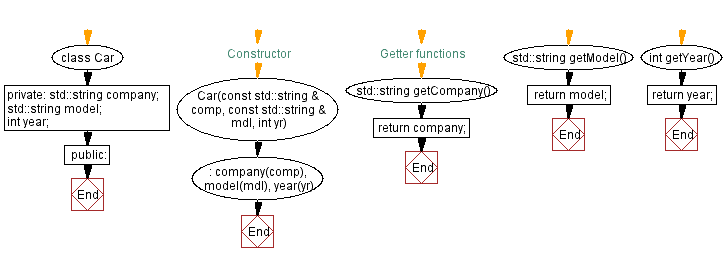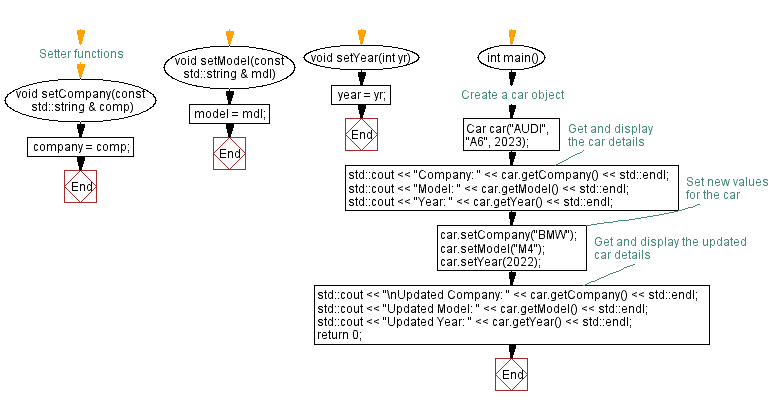C++ Object-Oriented Programming: Car class
4. Car Class with Company, Model, and Year
Write a C++ program to create a class called Car that has private member variables for company, model, and year. Implement member functions to get and set these variables.
Sample Solution:
C Code:
#include <iostream> // Including the necessary header for input/output stream
#include <string> // Including the necessary header for string operations
class Car { // Defining a class named Car
private:
std::string company; // Private member to store the company name of the car
std::string model; // Private member to store the model name of the car
int year; // Private member to store the year of the car
public:
// Constructor to initialize Car object with provided values
Car(const std::string & comp, const std::string & mdl, int yr): company(comp), model(mdl), year(yr) {}
// Getter functions to retrieve private member variables
std::string getCompany() { // Getter function for retrieving the company name
return company; // Return the stored company name
}
std::string getModel() { // Getter function for retrieving the model name
return model; // Return the stored model name
}
int getYear() { // Getter function for retrieving the year
return year; // Return the stored year
}
// Setter functions to modify private member variables
void setCompany(const std::string & comp) { // Setter function for modifying the company name
company = comp; // Assign the provided company name to the 'company' member variable
}
void setModel(const std::string & mdl) { // Setter function for modifying the model name
model = mdl; // Assign the provided model name to the 'model' member variable
}
void setYear(int yr) { // Setter function for modifying the year
year = yr; // Assign the provided year to the 'year' member variable
}
};
int main() {
// Create a car object with initial values
Car car("AUDI", "A6", 2023);
// Get and display the car details using getter functions
std::cout << "Company: " << car.getCompany() << std::endl; // Output the car's company name
std::cout << "Model: " << car.getModel() << std::endl; // Output the car's model name
std::cout << "Year: " << car.getYear() << std::endl; // Output the car's year
// Set new values for the car using setter functions
car.setCompany("BMW"); // Update the car's company name
car.setModel("M4"); // Update the car's model name
car.setYear(2022); // Update the car's year
// Get and display the updated car details using getter functions
std::cout << "\nUpdated Company: " << car.getCompany() << std::endl; // Output the updated car's company name
std::cout << "Updated Model: " << car.getModel() << std::endl; // Output the updated car's model name
std::cout << "Updated Year: " << car.getYear() << std::endl; // Output the updated car's year
return 0; // Return 0 to indicate successful completion
}
Sample Output:
Company: AUDI Model: A6 Year: 2023 Updated Company: BMW Updated Model: M4 Updated Year: 2022
Explanation:
In the above exercise,
- The "Car" class represents a car with private member variables company, model, and year. The constructor initializes these variables.
- The getter functions (getCompany(), getModel(), getYear()) are used to retrieve the values of the private member variables.
- The setter functions (setCompany(), setModel(), setYear()) are used to modify the values of the private member variables.
- In the main() function, a Car object is created with the company as "AUDI", model as "A6", and year as 2023. The getter functions (getCompany(), getModel(), getYear()) are then called to retrieve and display the car details.
- Next, the setter functions (setCompany(), setModel(), setYear()) are used to set new values for the car's company, model, and year. Again, the getter functions are called to retrieve and display updated car details.
Flowchart:


For more Practice: Solve these Related Problems:
- Write a C++ program to implement a Car class with private members for company, model, and year, and include methods to update and display these attributes.
- Write a C++ program to create a Car class that validates the year of manufacture and overloads the equality operator to compare two cars.
- Write a C++ program to design a Car class with member functions to get and set its attributes, and a static member function that prints the total number of Car objects created.
- Write a C++ program to implement a Car class that uses constructors for initialization and includes a member function to display car details in a formatted string.
Go to:
PREV : Person Class with Name, Age, and Country.
NEXT : BankAccount Class with Deposit and Withdraw.
CPP Code Editor:
Contribute your code and comments through Disqus.
What is the difficulty level of this exercise?
